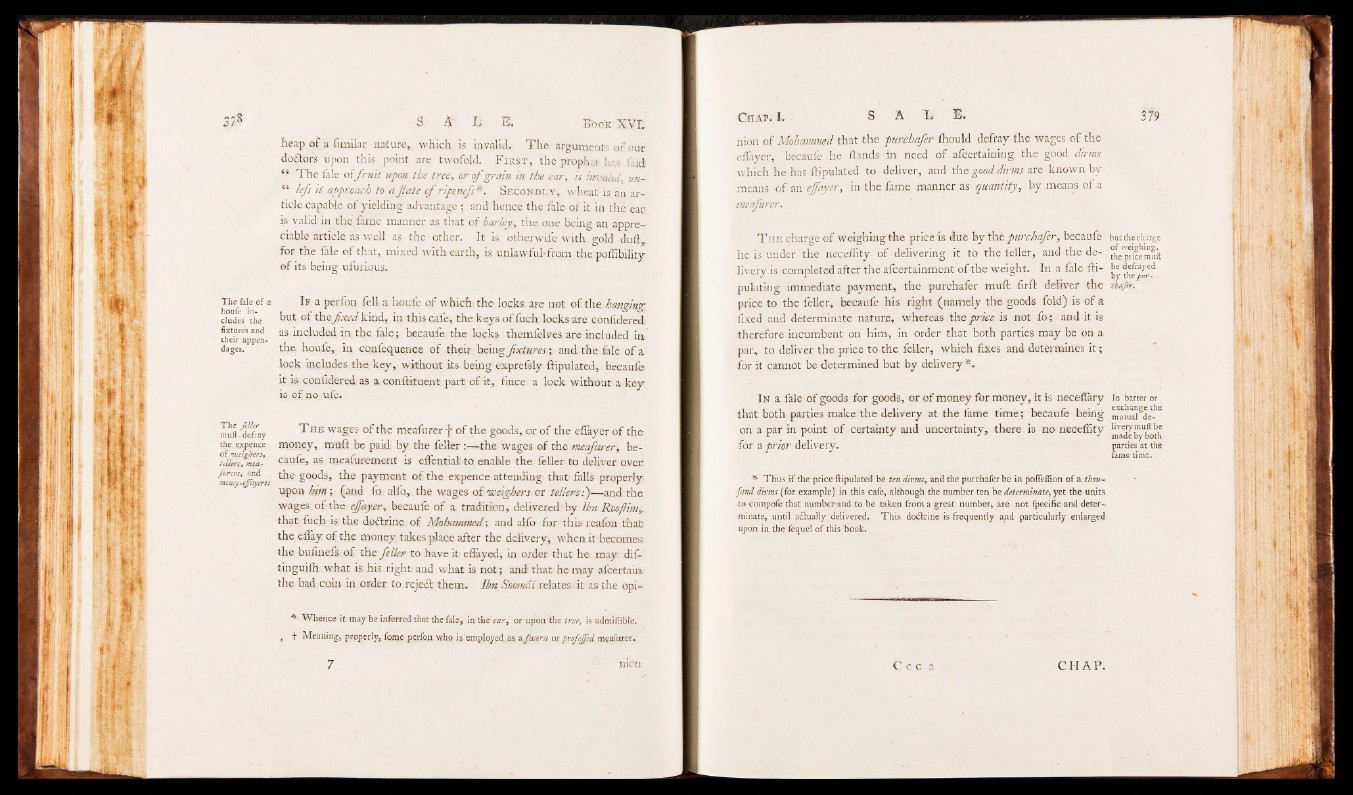
T he {ale o f a
houfe includes
the
fixtures and
their appendages.
T h e feller
muft, defray
the expence
o f weighers,
tellers, meet-
Jurers, and
money.ej/ayers:
heap, of a fixnilar nature, which is invalid. The arguments of oar
doctors upon this point are twofold. F irst, the prophet has faid
“ The fale off r u i t upon th e tr e e , or o f g ra in in th e ea r , is in v a lid tin -
“ le fs it. approach to a f a t e o f r ip e n e fs* . Secondly, wheat is an article
capable of yielding advantage ; and hence the fale of it in the ear-
is- valid in the' fame manner as that of b a rley , the one being an appreciable
article as well as the other. It is otherwife with-gold dull,
for the fale of that, mixed with earth, is unlawful-from thepoffibility
o f its being uffirious,.
Ie a perfon fell a houfe of which the locks are not ' of the h an g in g
but offirst fixed kind,, in this cafe, the keys;offuch locks are confidered
as included in, the fale; becaufe the locks the.mfjelves. are included in
the houfe, in confequence of their being fix tu r e s -,, and the fale of a
lock includes the key, without its being-exprefsly fiipulated, becaufe
it is coinidered as a conftituent: part of it, fence a lock without a key
is of no ulp. •
T he wages- of the meafurer-^ of the goods, or of the eflayer of the
money, muft.be paid by the feller :— the wages of the meafurer, becaufe,
as mcafumnent is ejfential to enable the feller to deliver over
the goods, the payment of the expence attending that: falls properly,
upon him',; (and fo alio., the wages of nveighers.ox tellers:')— and the
wages.ofthe: effayer,. becaufe of a tradition, delivered-by Ibn.Rbuftm,.
that fuch- is the doftrine. of Mohammed; and abb for this- reafoa that
the eflay of the money takes place after the delivery, when.it becomes;
the buliiicfs. of the feller to have it eflayed; in. order that he may. dif-
tinguifh what is., his .right and what is not; and* that he may afeertain
the. bad coin in order to rejedr them. Ibn Soomdi relates it as the opi*
Whence it may be inferred, that the fale, in the ear, or-upon the tree, is admiffible.
t t Meaning, properly,, fome perfon who is employed as s s jw o r n .o r f r o f e jjc d .meafurer.
7 mon
nion of M oham m ed that -the p u r th a fe r fhould defray the wages of the
effayer, becaufe he hands in need of afeertaining the good dirms
which he has fiipulated to deliver, and the g ood dirm s are known by
means of an e ffa y er, in the fame manner as q u a n tity , by means of a
m ea furer.
T he charge of weighing the price is due by tht p u r ch a fe r , becaufe
he is under the neceffity of delivering it to the leller, and-the de- ■
livery is completed after the afeertainment ofthe weight. In a fale fti-
pulating immediate payment, the purchafer muft firft deliver the
price to the feller, becaufe his right (namely the goods fold) is of a
fixed and determinate nature, whereas tht p r ic e is not fo; arid it is
therefore incumbent on him, in order that both parties may be on a
par, to deliver the price to the feller, which fixes and determines it ;
■ for it cannot be determined but by delivery*.
In a fale of goods for goods, or of money for money, it is neceffery
that both parties make the delivery at the feme time ; becaufe being
on a par in point of certainty and uncertainty, there is no neceffity
for a p r io r delivery.
* T h u s i f the price fiipulated be ten dirms, and the purchafer be in pofTeflion o f a thousand
dirms (for example) in this cafe, although the number ten be determinate, y et the units
to compofe that number-and to be taken from a great number, are not fpeeific and determinate,
until actually delivered. T h is do&rine is frequently and particularly enlarged
upon in the fequel o f this book-.
but the charge
o f weighing,
the price mu ft
be defrayed
b y the pttr-
chafer.
In barter or
exchange the
mutual deliv
ery muft be
made b y both
parties at the
fame time.
C C C 2 C H A P .